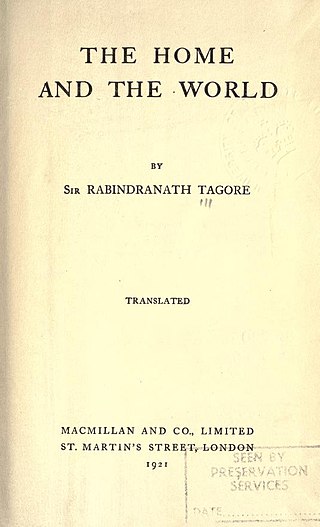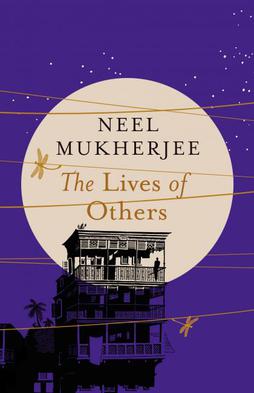Related Research Articles

Mulk Raj Anand was an Indian writer in English, recognised for his depiction of the lives of the poorer class in the traditional Indian society. One of the pioneers of Indo-Anglian fiction, he, together with R. K. Narayan, Ahmad Ali and Raja Rao, was one of the first India-based writers in English to gain an International readership. Anand is admired for his novels and short stories, which have acquired the status of classics of modern Indian English literature; they are noted for their perceptive insight into the lives of the oppressed and for their analysis of impoverishment, exploitation and misfortune. He became known for his protest novel Untouchable (1935), which was followed by other works on the Indian poor such as Coolie (1936) and Two Leaves and a Bud (1937). He is also noted for being among the first writers to incorporate Punjabi and Hindustani idioms into English, and was a recipient of the civilian honour of the Padma Bhushan.

Rabindra Bharati University is a public research university in Kolkata, India. It was founded on May 8, 1962, under the Rabindra Bharati Act of the Government of West Bengal in 1961, to mark the birth centenary of the poet Rabindranath Tagore. It is located at the Tagore family home, Jorasanko Thakur Bari. The university offers undergraduate and postgraduate programmes in Performing Arts and Visual Arts under the Faculty of Fine Arts, Humanities, Social Sciences and other subjects under the Faculty of Arts.

Rabindra Sangeet, also known as Tagore Songs, are songs from the Indian subcontinent written and composed by the Bengali polymath Rabindranath Tagore, winner of the 1913 Nobel Prize in Literature, the first Indian and also the first non-European to receive such recognition. Tagore was a prolific composer with approximately 2,232 songs to his credit. The songs have distinctive characteristics in the music of Bengal, popular in India and Bangladesh.

Rana Dasgupta is a British novelist and essayist. He grew up in Cambridge, England, and studied at Balliol College, Oxford, the Conservatoire Darius Milhaud in Aix-en-Provence, and, as a Fulbright Scholar, the University of Wisconsin–Madison. In 2010 The Daily Telegraph called him one of Britain's best novelists under 40. In 2014, Le Monde named him one of 70 people who are making the world of tomorrow. Among the prizes won by Dasgupta's works are the Commonwealth Prize and the Ryszard Kapuściński Award.

The Home and the World is a 1916 novel by Rabindranath Tagore. The book illustrates the battle Tagore had with himself, between the ideas of Western culture and revolution against the Western culture. These two ideas are portrayed in two of the main characters, Nikhilesh, who is rational and opposes violence, and Sandip, who will let nothing stand in his way from reaching his goals. These two opposing ideals are very important in understanding the history of the Bengal region and its contemporary problems.
Raj Kamal Jha is an Indian newspaper editor and novelist writing in English. He currently serves as the Editor-in-Chief of The Indian Express. He has written six novels that have been translated into more than 12 languages. His journalism and fiction have won national and international awards, including the Commonwealth Writers Prize; Rabindranath Tagore Literary Prize; Tata Literature Live! Book of The Year; the International Press Institute India Award for Excellence in Journalism; and the Mumbai Press Club Journalist of the Year award. In September 2021, Jha was awarded Editor of The Year by the India Chapter of the International Advertising Association Annual Leadership Awards.

Rabindranath Tagore is a 1961 Indian documentary film written and directed by Satyajit Ray about the life and works of noted Bengali author Rabindranath Tagore. Ray started working on the documentary in early 1958. Shot in black-and-white, the finished film was released during the birth centenary year of Rabindranath Tagore, who was born on 7 May 1861. Ray avoided the controversial aspects of Tagore's life in order to make it as an official portrait of the poet. Though Tagore was known as a poet, Ray did not use any of Tagore's poetry as he was not happy with the English translation and believed that "it would not make the right impression if recited" and people would not consider Tagore "a very great poet," based on those translations. Satyajit Ray has been reported to have said about the documentary Rabindranath Tagore in his biography Satyajit Ray: The Inner Eye by W. Andrew Robinson that, "Ten or twelve minutes of it are among the most moving and powerful things that I have produced."

Rabindranath Tagore was an Indian poet, writer, playwright, composer, philosopher, social reformer, and painter of the Bengal Renaissance. He reshaped Bengali literature and music as well as Indian art with Contextual Modernism in the late 19th and early 20th centuries. Author of the "profoundly sensitive, fresh and beautiful" poetry of Gitanjali, in 1913 Tagore became the first non-European and the first lyricist to win the Nobel Prize in Literature. Tagore's poetic songs were viewed as spiritual and mercurial; where his elegant prose and magical poetry were widely popular in the Indian subcontinent. He was a fellow of the Royal Asiatic Society. Referred to as "the Bard of Bengal", Tagore was known by the sobriquets Gurudeb, Kobiguru, and Biswokobi.
Anuradha Roy is an Indian novelist, journalist and editor. She has written five novels: An Atlas of Impossible Longing (2008), The Folded Earth (2011), Sleeping on Jupiter (2015), All the Lives We Never Lived (2018), and The Earthspinner (2021).
The Tagore Award is an award given in commemoration of the 150th birth anniversary of the Nobel laureate Rabindranath Tagore (1861–1941) for cultural harmony. Established in 2011 by Government of India, it is given for outstanding achievement in fostering harmony and universalism and values of cultural harmony especially in conflict or extreme situations through innovative systems/strategies and which have an enduring and transformational impact. This award carries an amount of Rupees One Crore, a Citation in a Scroll, a Plaque as well as an exquisite traditional handicraft/handloom item. The first award was given in 2012 to Pandit Ravi Shankar by the President of India Pranab Mukherjee. Ravi Shankar died before he could receive the award which was received by his wife Sukanya Shankar.

The Lives of Others is a novel by Neel Mukherjee. It was published in 2014 by Chatto & Windus in the UK and W. W. Norton & Company in the US. The novel, the author's second one, was shortlisted for the 2014 Man Booker Prize on 9 September 2014. Bookbinder Tom McEwan was commissioned to make a custom binding for the book at the ceremony at the Guildhall.

Sandip Soparrkar is an Indian Latin and ballroom dancer, choreographer, actor, columnist, Philanthropist, Dance Reality Show judge, Radio Jockey, Dance Therapist, Sufi and Tanoura Dancer and a Ted X speaker, who holds a doctorate in World Mythology Folklore from Pacifica Graduate Institute United States and also an Honorary Doctorate in Performing arts from The National American University. He has been honoured with 3 National Excellence Awards and 1 National Achievement Award by the Government of India, he is also the recipient of the Rabindranath Tagore Literary Prize for Social Achievement. and the prestigious Bharat Gaurav Samaan given by the Ministry of Culture at The House of Lords, London, UK. He is also a recipient of the Prestigious Shakti Samman given to him in form of a Sword by the Ministry of Culture, Government of India.

Stories by Rabindranath Tagore is a 2015 Indian Hindi-language television series which aired on the Epic channel. It is directed by Anurag Basu.
JCB Prize for Literature is an Indian literary award established in 2018. It is awarded annually with ₹2,500,000 (US$30,000) prize to a distinguished work of fiction by an Indian writer working in English or translated fiction by an Indian writer. The winners will be announced each November with shortlists in October and longlists in September. It has been called "India's most valuable literature prize". Rana Dasgupta is the founding Literary Director of the JCB Prize. In 2020, Mita Kapur was appointed as the new Literary Director.

Ghawre Bairey Aaj is a Bengali political drama film directed by Aparna Sen. The film starring Jisshu Sengupta, Anirban Bhattacharya and Anjan Dutt, released on 15 November 2019 under the banner of Shree Venkatesh Films. It is the modern retelling of Ghare Bairey, 1916 classic novel of Rabindranath Tagore.
Martin Kämpchen is an author, translator, journalist and social worker.

Nirmala Govindarajan is an Indian novelist and journalist. Her novel Taboo (2019) was shortlisted for the Rabindranath Tagore Literary Prize and was longlisted for the Atta Galatta Bangalore Literature Festival Book Prize in 2020.
Vinita Agrawal is an Indian poet, editor and curator. She is the author of four books of poetry and the editor of an anthology on climate change. She was short listed for 2018 Rabindranath Tagore Literary Prize for her poetry collection The Silk of Hunger and awarded the prize jointly. She is on the advisory board of the Tagore Literary Prize. She is a poetry editor with Usawa Literary Review.

Sekhar Bandyopadhyay is an Indian historian and a Fellow of the Royal Society Te Apārangi. Bandyopadhyay is known for his research on the Dalit caste of Bengal.

The 1913 Nobel Prize in Literature was awarded to the Bengali polymath Rabindranath Tagore (1861–1941) "because of his profoundly sensitive, fresh and beautiful verse, by which, with consummate skill, he has made his poetic thought, expressed in his own English words, a part of the literature of the West." He is the first and remains only the Indian recipient of the prize. The award stemmed from the idealistic and accessible nature of a small body of translated material, including the translated Gitanjali.
References
- ↑ "Rabindranath Tagore Literary Prize – Maitreya Publishing Foundation".
- ↑ "Rabindranath Tagore Literary Prize shortlist announced". Hindustan Times. 28 November 2020.
- ↑ "TAGOREPRIZE 2018. – Rabindranath Tagore Literary Prize".
- ↑ "Rana Dasgupta bags 2019 Tagore Literary Prize". Business Standard India. 24 April 2019 – via Business Standard.
- ↑ "Sandip Soparrkar: I'm overwhelmed to be the winner of Tagore Social Achievement Prize 2020 - Times of India". The Times of India .
- ↑ "Raj Kamal Jha wins Rabindranath Tagore Literary Prize 2020 for the City and the Sea". 7 December 2020.
- ↑ "Rabindranath Tagore Literary Prize to be merged for year 2021, 2022: Organisers". The Indian Express. 8 December 2021. Retrieved 15 December 2021.
- ↑ "SHORTLIST 2020 – Rabindranath Tagore Literary Prize".
- ↑ "TagorePrize SHORTLIST 2019. – Rabindranath Tagore Literary Prize".
- ↑ Service, Tribune News. "Rabindranath Tagore Literary Prize shortlist announced". Tribuneindia News Service.
- ↑ "Raj Kamal Jha wins Rabindranath Tagore Literary Prize 2020 for The City and the Sea". The Indian Express. 7 December 2020. Retrieved 7 December 2020.
- ↑ "TAGOREPRIZE 2018. – Rabindranath Tagore Literary Prize" . Retrieved 9 December 2020.
- ↑ "TagorePrize 2019. Social Achievement Prize – Rabindranath Tagore Literary Prize" . Retrieved 9 December 2020.
- ↑ "Raj Kamal Jha wins Rabindranath Tagore Literary Prize 2020 for The City and the Sea". The Indian Express. 7 December 2020. Retrieved 9 December 2020.